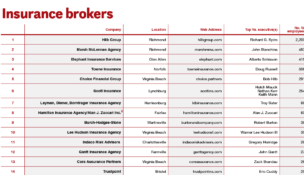Digital tools improve workflow, efficiency for CPAs
Technological advances change business as usual for accounting firms

Antonina McAvoy, a partner at PBMares, says AI-powered tools for advisory and audit firms can free up employees’ time. Photo by Mark Rhodes

Antonina McAvoy, a partner at PBMares, says AI-powered tools for advisory and audit firms can free up employees’ time. Photo by Mark Rhodes
Digital tools improve workflow, efficiency for CPAs
Technological advances change business as usual for accounting firms
When David Chase started working as a certified public accountant 25 years ago, he and his colleagues kept documents in big paper binders, the kind high school students commonly used in the 1970s and 1980s.
“The client would give you their paperwork, you’d make copies, put them in three-ring binders and work with pencils,” says Chase, head of tax at Wall Einhorn & Chernitzer, which is based in Norfolk.
One of Chase’s colleagues, Angela R. Kerns, a CPA and managing shareholder at Wall Einhorn, recalls when auditors would use large rolling briefcases to transport paper documents from their offices to those of their clients and back. Internally, the briefcases would be rolled from junior accountants who conducted the initial work to senior accountants and finally to a partner who did the final overview.
During the last 15 years or so, advances in technology have dramatically changed the way accounting firms do their work and how they interact with clients and each other. Using various technological tools has streamlined the way accounting firms operate and allowed them to work more efficiently, providing added value to clients, Chase says.
“Our firm is 35 years old, and the technology we use has changed many times since our inception,” he notes. “Many people think of the accounting business as paper intensive. It certainly is document intensive. With the tools available to us, we’ve been paperless for years.
“The use of digital tools is now pro forma throughout the accounting industry.”
The numbers bear him out. In 2024, the accounting software market size was an estimated $19.7 billion, and it is expected to grow to more than $30 billion by 2029, according to Research and Markets.
A Workday survey of more than 260 chief financial officers worldwide found that 48% of those CFOs plan to invest in technology that automates various tasks, including accounting, financial planning and reporting, to streamline workflows and boost employee productivity.
Antonina McAvoy, a partner at Newport News-based CPA and consulting firm PBMares, recalls when auditors and their clients would email large files back and forth.
“We used to rely on manual document request lists, historically managed in Excel and exchanged via email, which often led to delays and inefficiencies in version control between the auditor and the client,” she says. “Even with modern secure file request platforms that centralize documents and communications, an auditor may not review uploaded evidence immediately, due to scheduling. If submitted documents contain missing or incorrect information, we have to submit follow-ups or mark the request as still open.”
Under that system, “It may take a week or two for a client to get back to us and provide the correct information,” McAvoy says. “These delays can add up. You could lose a whole month.”
Technological innovations also have led to changes in staffing. About a decade ago, Wall Einhorn had a set of its own data centers and a robust IT staff to maintain them, Chase says. As tech has evolved, the need to maintain such facilities and to pay for a large IT staff has dissipated.
“As tech has evolved in the last 10 years, it has allowed us to go to an outsource model,” Chase says. “We have moved all our systems to the cloud.”
Speeding up work
Generative AI platforms — the most famous of which is ChatGPT — can conduct many tasks formerly performed by humans at accounting firms, including reviewing policy and procedure documents, checking basic information like job titles, producing financial and compliance reports, conducting real-time data analysis and summarizing a client’s financial information.
PBMares uses a generative AI platform from Fieldguide that’s designed specifically for advisory and audit firms. McAvoy says that auditors using the tool can review documents much more quickly.
“Generative AI allows the human auditor to efficiently analyze large volumes of data, freeing up time that would otherwise be spent on an initial manual review,” McAvoy explains. “This allows auditors to dive more deeply into all areas of client concern, perform additional audit tests, and identify potential fraud or security risks more effectively, go into greater depth in reviewing documents for such issues as fraud.”
What’s more, she adds, “the outcome is a more thorough, insightful audit that not only enhances value for the client but also provides them with strategic insights to make informed decisions that strengthen their business, improve operational resilience and drive greater shareholder value.”
During the last decade or so, many accounting firms have adopted tools like Slack, Zoom, Box, Microsoft Teams, OneDrive and Google Drive to allow employees to collaborate and communicate in real time with each other and with clients.
Some accounting firms go further, using tools like sync boxes that bring all tasks together on one platform, using project management tools like to-do lists and dashboards.
Also, assisting accountants who are more comfortable crunching numbers than producing prose, ChatGPT is good for composing emails to clients and colleagues, as well as creating marketing plans. Chase says ChatGPT is also useful in updating a firm’s employee manual and HR documents, and he believes it will soon be used in performance evaluations.
“I can’t tell you how helpful it is when we need to address the firm, whether it’s remarks at a holiday party, a staff meeting or how we’re going to respond to the pandemic,” Chase says. “You drop it in there, you verify it, and you adjust it so it has the right tone.”
Another generative AI tool, Blue J, helps accountants find answers to complex tax questions by providing a sharply curated database, comprised of reliable tax resources, such as IRS codes and regulations, that is updated daily to keep up with changes to the tax code. The tool provides citations and source lists that are verifiable.
Rather than poring over traditional tax research tools, accountants can use Blue J to find answers in seconds. An experienced legal research team oversees the tool’s algorithms, and the tool also provides user feedback channels.
“I looked at Blue J a year-and-a-half ago. At that time, it was a shiny object,” Chase says. “Now we’re using it firmwide, from interns to senior partners. I’m very impressed.”
Despite all of the advances in AI tools, accounting firms still need humans to do certain tasks, and the sector has had notable struggles in hiring and retaining employees, although higher pay and better benefits have helped.
In the 2025 Virginia General Assembly, the House of Delegates and the state Senate passed legislation that broadens the avenues available to people seeking a CPA license. The legislation, which was requested by the Virginia Society of CPAs, is set to take effect Jan. 1, 2026, and will provide these three ways to obtain a license: A master’s degree and one year of relevant experience; a bachelor’s degree, 30 additional credit hours and a year of experience; or a bachelor’s degree and two years of experience.
CPAs still will have to pass the licensing exam, as well as completing 24 upper-level accounting credits and 24 business credits in college, but the changes give people with on-the-job experience an opportunity.
“We are highly encouraged by Virginia’s speed in implementing this alternative pathway,” Kerns says. “Our goal as a profession is to increase the number of college students pursuing accounting as their long-term career. While academic learning serves as a critical foundation, hands-on experience with industry tools provides an equally valuable form of education.”
S


















